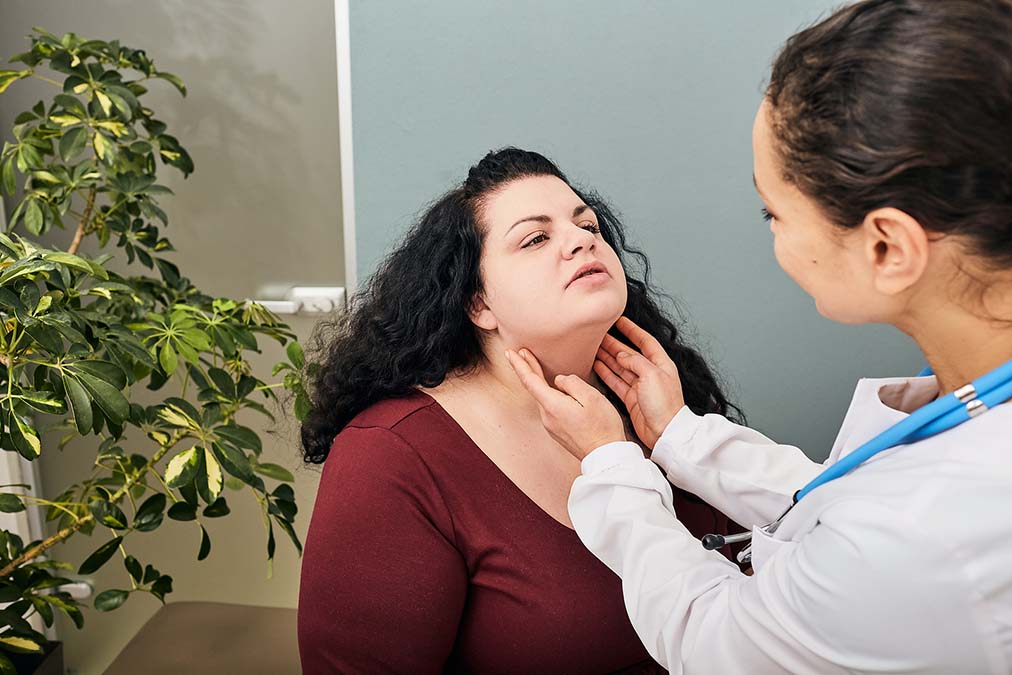 Most people think of hypothyroidism as a condition that primarily interferes with weight and energy levels.
Most people think of hypothyroidism as a condition that primarily interferes with weight and energy levels.
But a new study in the Journal of Clinical Endocrinology & Metabolism warns that it can directly cause stroke and death.
Researchers obtained information for analysis from the Veterans Health Administration. The data came from 733,208 people with at least two thyroid-stimulating hormone measurements and 406,030 patients with at least two free thyroxine measurements.
If you have hypothyroidism, your thyroid-stimulating hormone is usually high (indicating that your thyroid needs extra stimulation to secrete enough of its hormones), while your free thyroxine level is low. Thyroxine is the thyroid hormone itself.
The subjects were observed between 2004 and 2017 to check specifically for two conditions: stroke and atrial fibrillation.
Atrial fibrillation is important because it is a serious risk factor for stroke. It is a heart rhythm disorder in which the heart occasionally pauses, which may lead to blood clotting and, in turn, cause a stroke.
During the study period, 71,333 of the subjects (11.08%) developed atrial fibrillation and 41,931 (6.32%) suffered a stroke.
The overall findings were generally what the researchers expected:
-
1. Those with hyperthyroidism were more likely to suffer a stroke, with low thyroid-stimulating hormone increasing their risk by 33% and high free thyroxine increasing it by 17%.
2. Those with hypothyroidism were also more likely to suffer a stroke, with high thyroid-stimulating hormone and low free thyroxine increasing their risk by 29% each.
3. Both hyperthyroidism and hypothyroidism put the subjects at risk of atrial fibrillation.
This means that—compared to people with normally functioning thyroid glands—people with an over- or underactive thyroid have an increased stroke risk.
Furthermore, their atrial fibrillation and stroke risks increase over time, the longer they live with their abnormal thyroid hormone levels.
All of this is perhaps unsurprising when previous research is taken into account.
In 2015, for example, Endocrinology and Metabolism published a literature review on the relationship between subclinical hypothyroidism and cardiovascular disease. With subclinical hypothyroidism, your thyroid-stimulating hormone is high, but your free thyroxine is still normal.
These researchers found that hypothyroidism patients were more likely to be overweight and have high cholesterol, high blood pressure, stiff and damaged arteries, and inflammation in their blood vessels.
So if you have hypothyroidism, it’s extremely important to normalize your cholesterol level by cutting out this one ingredient you didn’t even know you were consuming…
Or if you have high blood pressure, drop it in 9 minutes using the 3 easy exercises explained here…
But of course, the most important thing is to heal your hypothyroidism. Fortunately, that’s quite easy to do—just follow the simple, natural steps explained here…

 Overcoming IBD
Overcoming IBD Multiple Sclerosis
Multiple Sclerosis Banishing Bronchitis
Banishing Bronchitis Gum Disease Gone
Gum Disease Gone Overcoming Onychomycosis
Overcoming Onychomycosis Neuropathy No More
Neuropathy No More The Prostate Protocol
The Prostate Protocol Brain Booster
Brain Booster
 Ironbound
Ironbound
 Solution for Shingles
Solution for Shingles
 The Bone Density Solution
The Bone Density Solution
 The Ultimate Healing Protocol
The Ultimate Healing Protocol
 The Parkinson's Protocol
The Parkinson's Protocol
 The Chronic Kidney Disease Solution
The Chronic Kidney Disease Solution
 Overthrowing Anxiety
Overthrowing Anxiety The Fatty Liver Solution
The Fatty Liver Solution The Hypothyroidism Solution
The Hypothyroidism Solution
 The End of Gout
The End of Gout The Blood Pressure Program
The Blood Pressure Program
 The Oxigized Cholesterol Strategy
The Oxigized Cholesterol Strategy
 Stop Snoring And Sleep Apnea Program
Stop Snoring And Sleep Apnea Program
 The Arthritis Strategy
The Arthritis Strategy The Vertigo & Dizziness Program
The Vertigo & Dizziness Program The 3-Step Diabetes Strategy
The 3-Step Diabetes Strategy Hemorrhoids Healing Protocol
Hemorrhoids Healing Protocol The Erectile Dysfunction Master
The Erectile Dysfunction Master Weight Loss Breeze
Weight Loss Breeze The IBS Program
The IBS Program The Insomnia Program
The Insomnia Program The Migraine and Headache Program
The Migraine and Headache Program The Neck Pain Solution
The Neck Pain Solution The Menopause Solution
The Menopause Solution The Ejaculation Master
The Ejaculation Master The TMJ Solution
The TMJ Solution The Acid Reflux Solution
The Acid Reflux Solution The Fibromyalgia Solution
The Fibromyalgia Solution The Psoriasis Strategy
The Psoriasis Strategy